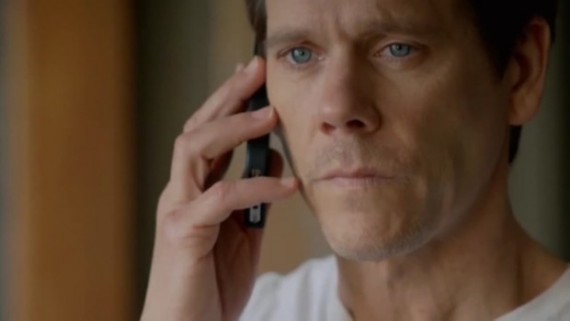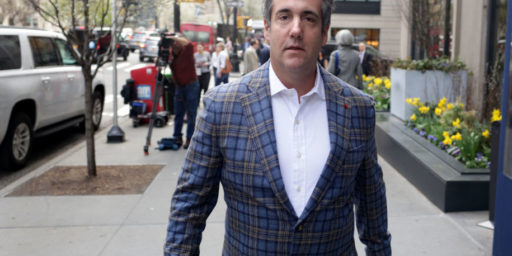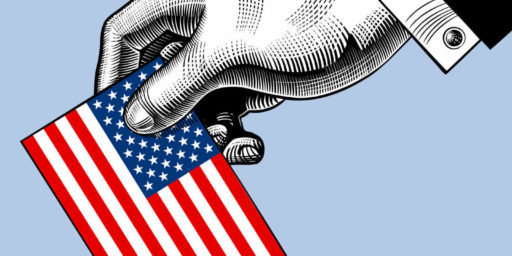Three Hops and You’re Out
Think of it as the spy version of Six Degrees of Kevin Bacon.
My latest for The National Interest, “NSA: Three Hops and You’re Out,” has posted. It’s been rendered a bit stale owing to the vagaries of an editorial transition at the magazine but still worth a look.
The startling new insight came from NSA Deputy Director John Inglis, who testified before the House Judiciary Committee that the FISA court “has approved us to go out two or three hops.” As described by the Washington Post, “When analysts think they have cause to suspect an individual, they will look at everyone that person has contacted, called the first hop away from the target. Then, in a series of exponential ripples, they look at everyone all those secondary people communicated with. And from that pool, they look at everyone those tertiary people contacted. This is called a second and a third hop.”
Think of it as the spy version of Six Degrees of Kevin Bacon. (Indeed, the Onion linked Bacon to al Qaeda in just five hops in 2002; one imagines he’s within three hops by now.)
How intrusive is this? It’s not really clear.
[…]
The problem, of course, is that the very existence of the database creates the opportunity for abuse. Has it been abused? Not that we know of. Then again, we didn’t know about the program itself until its details were revealed illegally by a man now hiding out in Russia.
Nor do we have any real way of knowing what it is that we’ve gained in return for the additional risk. How many terrorists have been caught and how many potentially deadly plots have been thwarted as a result of this intrusive collection? Well, that’s classified.
More at the link.







If only as much time was spent on the institutionalization of torture as with this.
@C. Clavin: I’m not sure what it is you’re referring to or objecting to.
Certainly, a lot of pixels have been spilled on torture and related issues (waterboarding, extraordinary rendition, enhanced interrogation techniques, Abu Ghraib, Gitmo, etc.) over the years. The reason this particular controversy is receiving so much attention is that it’s news (in the sense that we’re just learning the details of most of this) and it’s much more widespread. While I oppose torture, for a whole variety of reasons that I’ve laid out in detail over the years, it’s a least a very limited practice; here, all of us are directly impacted.
The abuse will come by guilt by association even if the linkages prove to be irrelevant. An individual will have very few resources to withstand that.
BTW, from the title, I was excited to read an article on beer. Alas, it was not to be.
A very balanced article at the linked site, sir. I generally support the gathering of this sort of data; believing as I do that it’s better to have a well-informed policeman than an ignorant one. But still, there are historic and present figures (Att’y Gen Palmer, Sen Joseph McCarthy, that person who warned us about all those Communist Professors @ Harvard Law) that give one pause. One hopes the watchmen never sleep.
This is just stupid. So the sleepers know they just need four hops to evade detection. In the meantime, millions of innocent Americans are automatically implicated.
I think the idea that torture doesn’t affect us all is incredibly short-sighted.
We, as a country,have a very hard time understanding what’s important and what isn’t.
It’s why we read more about Weiner’s weiner than Steve King’s despicable bigotry.
Say I’ve contacted 200 people (first hop). Each of those 200 people has themselves contacted 200 people (second hop), resulting in a pool of 40,000 people. And each of those 40,000 people has also contacted 200 people (third hop), resulting in a pool of 8,000,000 people. (Or, in shorter form, 200 x 200 x 200 = 8,000,000).
So, cause to suspect one person suddenly and conveniently gives them cause to suspect eight million people. If you don’t understand math, you don’t understand how extensive and intrusive this actually is.
@Rafer Janders: I point that out in the piece. The question, though, is exactly what it means. If all they’re doing is using computer algorithms to make connections between numbers and look for patterns, it may be a big pile of nothing. There’s no evidence that NSA is doing anything nefarious with the information. Doing so would in fact be illegal. The problem is that they could conceivably do it anyway.
At the heart of this issue is a dicotomy that didn’t just appear with the latest technology…or even terrorism. Try reading Hobbes…from the 17th century.
Security versus Freedom. But that’s a false dicotomy. And Hobbes was way off base.
Freedom requires security. Security allows us our freedom. The key to life is proper balance in all things.
This doesn’t affect me…contrary to what you might think. I’m not being threatened, or restrained, or coerced. Nothing…absolutely nothing…about my behavior need change.
Time may prove me wrong…but right now I’m just hearing libertarian fever-dreams.
@James Joyner:
There’s also no evidence that they’re not doing anything nefarious with it, since most of what the NSA does is secret.
@C. Clavin:
Who is losing freedom, and who is gaining security? They are rarely the same individual. In the US, you have nothing to fear from your government as long as you are one of the right people.
If you are one of the right people, you will never be rounded up and put into detainment centers. If you are one of the right people, you will never have secret experiments done to you by your government. If you are one of the right people, you will never have your land taken from you. If you are one of the right people, you will never have your social clubs, churches, or mosques infiltrated. If you are one of the right people, you will never have an FBI secret file because you are a rabble rouser. If you are one of the right people, you will never be accused of being a rabble rouser. If you are one of the right people, you will never have your civil liberties infringed upon. If you are one of the right people, you will never be “profiled”.
If you are one of the right people, your freedom will never be taken. If you are one of the right people, your security is more important than the freedom of “those people”.
Not to worry, “those people” expect to be f*cked over by their government to ensure your life remains a slice of heaven, and no amount of “libertarian fever-dreams” will change that reality. “Thus has it always been, thus shall it ever be.” Or, White makes right.